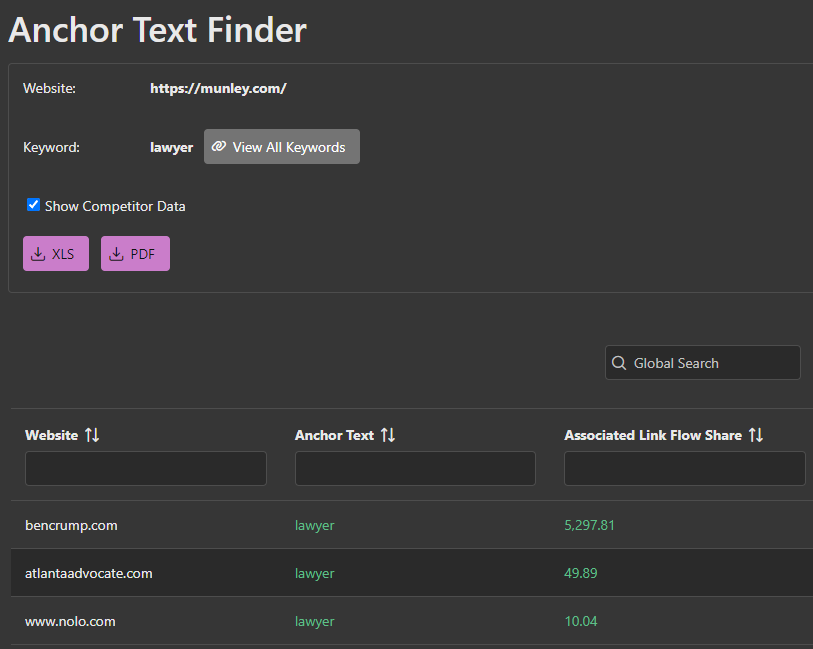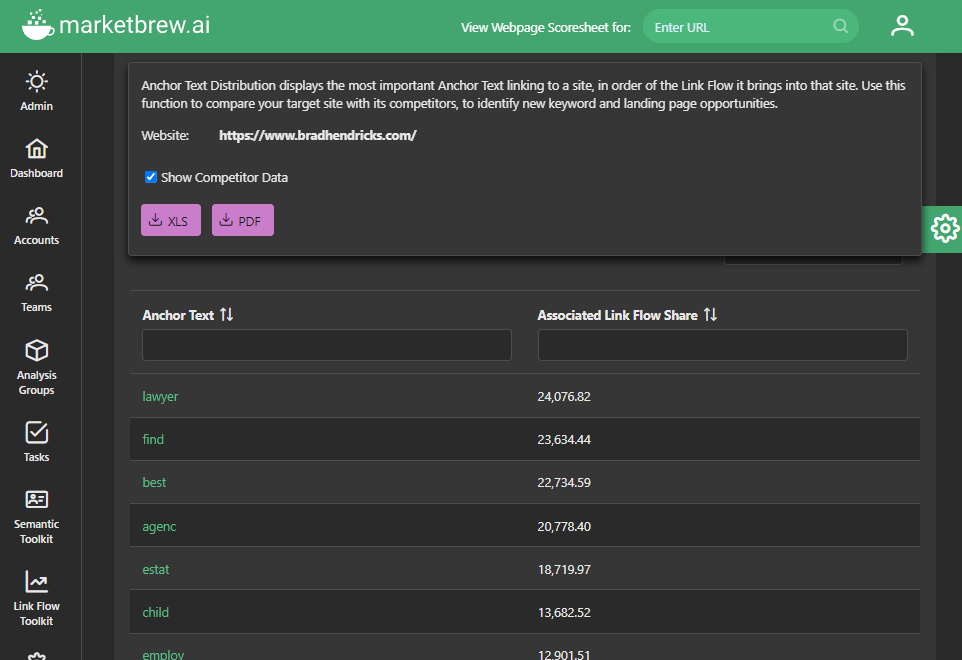Importance of Anchor Text in SEO
Anchor text is the clickable text in a hyperlink that leads to a different web page. In the realm of search engine optimization (SEO), anchor text plays a crucial role in how search engines interpret and rank web pages.
This article discusses the importance of anchor text in SEO, how to optimize anchor text for better search engine ranking, and the potential drawbacks and pitfalls of using anchor text incorrectly.
The world of search engine optimization (SEO) is constantly evolving, and with the rise of artificial intelligence (AI) for SEO and natural language processing, a new method known as semantic SEO has emerged. This approach focuses on using structured data and knowledge graphs to provide more accurate and relevant search results for users.
But what exactly are knowledge graphs and how do they work? And how can they be used to improve your website's search engine rankings? In this article, we will explore the basics of knowledge graphs and semantic SEO, including the benefits of using them and how to implement them on your website.
Introduction to Anchor Text and Its Role in SEO
Anchor text, also known as link text or hyperlink text, is the visible, clickable text in a hyperlink that leads to a different web page. In the realm of search engine optimization (SEO), anchor text plays a crucial role in how search engines interpret and rank web pages.
When search engines crawl the web, they look at the content and structure of a web page, including the anchor text of any external links. This allows them to understand the context and relevance of the linked web page, and therefore, how to rank it in search results.
For example, if a web page about dog breeds includes a link with anchor text that says "best dog breeds for families," the search engine will understand that the linked web page is likely about dog breeds that are good for families. This helps the search engine determine the relevance and importance of the linked web page in relation to the keywords "best" and "dog breeds for families."
Therefore, the use of anchor text is an important factor in how search engines rank web pages, and should be carefully considered in any SEO strategy.
The Importance of Anchor Text in Search Engine Ranking
One of the main reasons that anchor text is so important in SEO is because it helps search engines understand the context and relevance of a linked web page.
When a web page includes a link with anchor text that includes relevant keywords, it signals to the search engine that the linked web page is likely to be relevant and useful to users searching for those keywords.
For example, if a web page about hiking trails in the Pacific Northwest includes a link with anchor text that says "best hiking trails in Washington state," the search engine will understand that the linked web page is likely to be about the best hiking trails in Washington state. This helps the search engine determine the relevance and importance of the linked web page in relation to the keywords "best" and "hiking trails in Washington state."
In addition to signaling relevance and context, anchor text can also help search engines understand the relationship between two web pages. For example, if a web page about hiking gear includes a link with anchor text that says "best hiking boots for beginners," the search engine will understand that the linked web page is likely to be about the best hiking boots for beginners. This helps the search engine determine the relationship between the two web pages and how they should be ranked in relation to each other.
Overall, the use of well-written and optimized anchor text can greatly improve a web page's search engine ranking, making it more likely to appear at the top of search results for relevant keywords.
How to Optimize Anchor Text for Better Search Engine Ranking
To take full advantage of the benefits of anchor text in SEO, it's important to optimize the anchor text of any external links on a web page.
Here are some tips for optimizing anchor text for better search engine ranking:
- Use keywords in anchor text: One of the most effective ways to optimize anchor text is to use relevant keywords in the anchor text. This signals to the search engine the context and relevance of the linked web page, and can help improve its ranking for those keywords.
- Avoid over-optimization and keyword stuffing: While using keywords in anchor text can be beneficial, it's important to avoid over-optimizing or keyword stuffing. This means using too many keywords in the anchor text, or using them excessively, in a way that is unnatural or spammy. This can result in penalties from search engines and hurt the overall ranking of the web page.
- Use variations of anchor text: Another effective way to optimize anchor text is to use variations of the same anchor text. This means using slightly different versions of the same anchor text, rather than repeating the same exact anchor text multiple times. This can help avoid over-optimization and keyword stuffing, and can also make the anchor text more natural and user-friendly.
- Include brand and non-keyword anchors: In addition to using keyword-rich anchor text, it's also important to include anchor text that includes the brand name of the web page or the linked web page. This can help improve the visibility and recognition of the brand, and can also signal to the search engine the relationship between the two web pages.
- Use descriptive anchor text: Finally, it's important to use descriptive anchor text that accurately describes the content of the linked web page. This can help improve the user experience and make it easier for users to understand the relevance and value of the linked web page.
potential drawbacks and pitfalls
Potential Drawbacks and Pitfalls of Using Anchor Text Incorrectly
While the use of optimized anchor text can greatly improve a web page's search engine ranking, it's important to avoid the potential drawbacks and pitfalls of using anchor text incorrectly.
Here are some potential issues to watch out for:
- Over-optimization and keyword stuffing: As mentioned earlier, over-optimization and keyword stuffing can result in penalties from search engines and hurt the overall ranking of a web page. It's important to avoid using too many keywords in anchor text, or using them in a way that is unnatural or spammy.
- Misleading or irrelevant anchor text: Another potential issue with anchor text is using anchor text that is misleading or irrelevant to the content of the linked web page. This can hurt the user experience and make it difficult for users to understand the relevance and value of the linked web page.
- Overuse of exact-match anchor text: Finally, it's important to avoid overusing exact-match anchor text, which is anchor text that exactly matches the target keyword. While this can be effective in improving a web page's ranking for that keyword, it can also be seen as manipulative by search engines and result in penalties.
The Importance of Carefully Considering and Optimizing Anchor Text in SEO Strategies
Anchor text plays a crucial role in search engine optimization (SEO) and should be carefully considered and optimized in any SEO strategy.
By using well-written and optimized anchor text, web pages can improve their search engine ranking and increase their visibility and relevance to users searching for relevant keywords.
To optimize anchor text for better search engine ranking, web page creators should use relevant keywords in the anchor text, avoid over-optimization and keyword stuffing, use variations of anchor text, include brand and non-keyword anchors, and use descriptive anchor text.
However, it's also important to avoid the potential drawbacks and pitfalls of using anchor text incorrectly, such as over-optimization and keyword stuffing, misleading or irrelevant anchor text, and overuse of exact-match anchor text.
Overall, the use of anchor text in SEO is an important factor in how search engines rank web pages, and should be carefully considered and optimized in any SEO strategy.
the market brew Anchor text graph
The Market Brew Anchor Text Graph
Market Brew allows users to inspect the entire Anchor Text Graph inside its search engine model, for any web site, all driven by the most advanced Link Graph in the industry.
Market Brew scores each and every link, with hundreds of link algorithm calculations, which produces a very accurate depiction of which links are valued the most by a search engine.
Because of these precise metrics, Market Brew can attribute each link's anchor text with the associated Link Flow of that link.

This paints a clear picture of exactly which keyword or named entities are driving the Link Graph, and is the key to understanding how a search engine sees the target page.
The Anchor Text Graph is crucially important to the topic cluster modeling inside of Market Brew, and this gives an easy path for SEO optimizers to precisely control the meaning of each page through the way each link is formed.

Competitor data is based on the competitors inside each of your search engine models, so the more models you create, the more complete the Anchor Text Graph will be.
Combining Market Brew's advanced Link Scoring and Link Graph technology with the Anchor Text Graph gives users unparalleled access to the mind of a search engine.
Algorithms like the Spotlight Focus, which depend on not only the content of the page but how that page is linked to, are highly dependent on these anchor text graphs, and as a Market Brew user you now have complete access to this previously hidden data.
Market Brew users can understand how anchor text diversity can shape the meaning of a page, giving them the ability to perfectly craft their message to both users and search engines.
You may also like
Guides & Videos
SEO Text Generation Ultimate Guide
Guides & Videos
Link Graph Leverage for SEO
Guides & Videos


